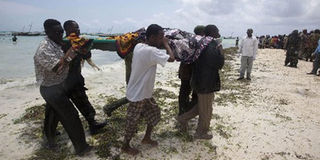Tanzania mourns for ferry victims as toll nears 200

Tanzanian rescuers carry a body on a beach of Zanzibar Island on September 10, 2011 after an overloaded ship sank overnight. At least 190 people died Saturday when a ferry capsized off the popular tourist archipelago of Zanzibar. Photo/AFP
Tanzanians on Sunday began three days of national mourning for victims of a ferry accident off the popular tourist archipelago of Zanzibar, in which nearly 200 people died. (Read: Zanzibar ferry sinks with 600 aboard)
But amid the grief, there were recriminations and anger that one of the worst maritime disasters in Africa in a decade could have been avoided if the ferry had not been patently overloaded, a fact acknowledged by the authorities.
The ferry Spice Islander, reportedly with more than 800 people as well as cargo on board, capsized early Saturday four hours into sailing between Unguja and Pemba, two of the three islands that make up Zanzibar, a semi-autonomous part of Tanzania.
"Most of these private boats (which ply the routes between the islands) are old and often overloaded but the authorities let it go on. If nothing changes this won't be the last accident like this," Abdurahman Alawi warned, who had seven members of his family on the doomed ferry.
"Out of the seven, only my niece, a young girl, survived. She is in hospital now. We were able to identify another member of the family, who was buried during the night. But with regard to the others, their bodies have not yet been recovered."
Zaid Amour, a 50-year-old survivor, put the blame squarely "on those who did not prevent the boat from leaving. We were already protesting to the captain and other people in the port before we left saying the boat was too full".
Rescue teams, who managed to pluck 612 people to safety before nightfall on Saturday, resumed their search early Sunday but did not expect to find any more survivors.
"We will continue to look for bodies, but there is no more hope of finding people alive. We are looking for the bodies so they can be buried," police spokesman Mohamed Mhina said.
"Bodies which have been able to be identified yesterday have been buried, some of them during the night. Those who could not be identified have been buried with dignity by the government," Mhina said, explaining that the rapidity of the burials was in accordance with Islam, the religion of the overwhelming majority of the population on Zanzibar.
He added that the morgue in the main hospital on Unguja, the biggest island in the archipelago, was not big enough to deal with a tragedy on this scale.
On Sunday morning inhabitants on Zanzibar began to gather in the Maisara stadium in Stone Town, where dozens of bodies had been laid out the day before so they could be identified.
A ceremony is being organised in the stadium to mark the start of three days of national mourning decreed by Tanzanian President Jakaya Kikwete.
State television TBC1 reported that the head of state had cancelled a three-day trip to Canada in the wake of the disaster.
The latest figures on passengers suggested more than 800 people were on board the doomed ferry, overwhelmingly locals and including families returning home after the holidays to celebrate the end of the Muslim holy month of Ramadan.
The exact number of passengers on this type of ferry is often difficult to establish as no reliable passenger lists are kept.
No foreigners have so far been reported amongst either the dead or rescued. However foreigners generally use high speed ferry services between the islands rather than hulks like the Spice Islander, which are 10 times slower.
Tourism is the main foreign currency earner for Zanzibar, famed for its white-sand beaches and historical buildings in Stone Town, listed as a world heritage site by UNESCO, the United Nations cultural organisation.
Pemba lies some 80 kilometres (50 miles) northeast of Unguja.




